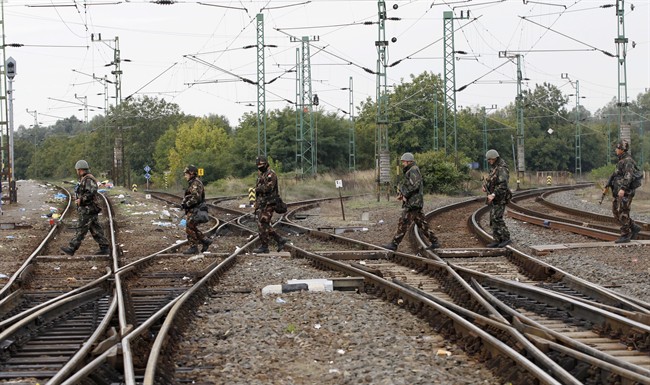ZAGREB, Croatia – Conciliation replaced confrontation among European nations which have clashed over their response to a wave of migration, but confusion faced many asylum-seekers streaming into Croatia on Saturday in hopes of chasing a new future in Western Europe.

Thousands were stranded at the border in the Croatian village of Strosinci, where Croatian authorities said they had been dropped by Serb buses.
Migrants trying to move on got lost in cornfields and were found by the Croatian police. More buses were deployed to take the travellers to the nearby transit camp at Opatovac, but families were separated.
READ MORE: Fate holds cruel twist for Syrian family sent to asylum centre
Such problems persisted despite a co-operative mode emerging.
Hungary has announced that it has removed spools of razor wire from a section of the border with Slovenia, a barrier that had been seen as breaching European Union rules about unrestricted travel within much of its territory. The gesture followed the reopening of the main border point between Croatia and Serbia.
The concessions, coming two days after a European Union summit on the crisis, suggest that the 28-nation bloc had become alarmed at the lack of co-operation among members and the increasingly ugly tone of their exchanges. The squabbling had hampered efforts to help the people fleeing war and poverty from the Middle East, Africa and Asia.
READ MORE: What EU leaders agreed to at summit on the migrant crisis
New problems arose on Saturday.
At the Strosinci camp, a woman from Damascus, who only gave her first name, Ranaa, said she lost her sons, 2 years old and 7 years old, after they boarded a bus to Opatovac without her. Later buses leaving her area were going directly to Hungary — bypassing the transit camp.

Get breaking National news
Distraught and struggling in English to make herself understood, she begged to be taken from Strosinci to the transit camp, where relatives have seen the children. Her fate is unclear.
In a visit to the camp, Ranko Ostojic, Croatia’s interior minister cited the Strosinci crossing as being particularly problematic.
“My opinion is that this is a torture for the people,” he said.
Hungary’s closure of its border with Serbia on Sept. 15 triggered a series of responses that sent migrants scurrying from one border to the next as they tried to reach Germany, Austria and other European countries that have offered safe haven. Some 66,000 had entered Croatia since Hungary shut its border with Serbia.

Croatia first welcomed the migrants, thinking they would transit through Slovenia, into Austria and on to Germany. But Slovenia refused to let the people pass, leaving Croatia, one of the poorest EU nations, responsible for them. The government in Zagreb then accused Serbia of shunting the refugees into its territory and closed the cargo crossing in retaliation.
Leaders have taken steps to address the troubles. After Croatia opened the border with Serbia on Friday, its prime minister, Zoran Milanovic, appeared on Serbia’s main television station to explain his actions. Likewise, Serbia’s leader, Aleksandar Vucic agreed to an interview on Croatian television.
The exchanges were testy, but the fact they occurred suggested movement to ease tensions between Croatia and Serbia, old rivals who fought a war amid the breakup of Yugoslavia in the 1990s.
Hungary’s Prime Minister Viktor Orban, also changed his tone. He promised to consult with others before Hungary completes a razor-wire fence along its border with Croatia, a move that would insert more confusion into an already difficult situation in the Balkans.
Djorjde Vlajic, a commentator and acting editor-in-chief of Serbia’s state Radio Belgrade 1, said the apparent softening of hard-line positions was the result of EU pressure on the smaller players to resolve their differences because the bloc must develop a unified response to the immense wave of refugees that is still on its way.
“The only countries ruffling the sea are the countries that will not solve the problem in the end, the transit countries,” Vlajic said. “So, ‘Teacher Europe’ said enough, stop and wait until serious players figure out how to solve this,” he said.
WATCH: Pope Francis urges Congress not to fear immigrants but to welcome them as fellow human beings
___
Associated Press Writer Amer Cohadzic in Strosinci, Croatia and Pablo Gorondi in Budapest contributed to this story.
- Donald Trump threatens to try and take back the Panama Canal
- At least 10 are killed as a small plane crashes into a Brazilian town popular with tourists
- Israeli expert urges justice for both Israeli, Palestinian victims of sexual violence
- Thousands stream into Belgrade square to protest against populist Serbian president







Comments